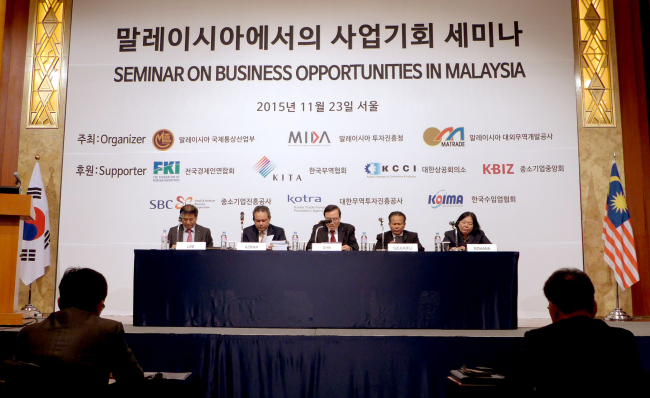Malaysia, a burgeoning Southeast Asian economy progressing into global integration, is aiming to attract investment from Korean enterprises exploring overseas advantages.
“The Korean companies in Malaysia have continuously reinvested, expanded and diversified their portfolio in information communications technology, automated processing and research and development, and shown confidence in our economy,” Azman Mahmud, head of the Malaysian Investment Development Authority, said in his opening speech at an investment seminar last week in Seoul.
The Seminar on Business Opportunities in Malaysia, held on Nov. 23 to beckon Korean investment, brought high-level government officials and businesspeople from the Southeast Asian country who provided up-to-date information on the country’s economic development and investment opportunities. It was followed by one-on-one meetings for the companies.
 |
(From left) Kiswire Limited executive vice president Lee Chang-woo, MIDA CEO Azman Mahmud, Regulatory Reform Committee chairman Ahn Choong-yong, MATRADE CEO Dato Dzulkifli Mahmud and Malaysian Ambassador Rohana Ramli speak at the Seminar on Business Opportunities in Malaysia at Lotte Hotel in Seoul on Nov. 23. Joel Lee / The Korea Herald |
According to the Central Bank of Malaysia, the country’s economy experienced 4.7 percent growth in the third quarter of this year, and is on track to maintain steady expansion on the back of national stability, investment-friendly policies and a zealous workforce.
The country has modernized the bulk of its infrastructure, much of it with the capital and know-how of Korean firms, in its bid to enhance physical, institutional and social connectivity with the Association of Southeast Asian Nations.
With the Association of Southeast Asian Nations set to launch its Economic Community at the end of this year, Malaysia aims to be a gateway to the integrated 600-million-strong consumer market with a $2.4 trillion combined gross domestic product.
“Malaysia welcomes investment in export-oriented, high-income industries, such as advanced new technologies, value-added services and knowledge-based, capital-intensive productions, particularly from the small and medium-sized enterprises,” Mahmud said.
According to a World Bank report this year, Malaysia was ranked 18th in the world in economic competitiveness and 10th in ease of doing business. Bloomberg rated Malaysia the world’s fifth-most promising emerging market, marking it as the only ASEAN economy included in its top 10 list.
The Malaysian government has initiated structural reforms ― its Government Transformation Program and Economic Transformation Program ― to enhance the efficiency and competitiveness of its bureaucracy and economy. The Eleventh Malaysia Plan 2016-2020 targets six strategic development goals: building an inclusive and equitable society, improving people’s welfare, enhancing human capital, pursuing sustainable development, constructing nationwide infrastructure and reengineering growth models for wider prosperity.
“Malaysia’s multicultural and multilingual population ― with Malays, Chinese, Indians and others ― speaks English well and is friendly toward foreigners,” said Lee Chang-woo, executive vice president of Kiswire Limited, which operates in Johor state, southern Malaysia, next to Singapore.
Korea has invested $179 million in Malaysia, largely covering processed and basic metals, lumber and wooden goods, transportation equipment and chemical products.
Since establishing diplomatic ties in February 1960, the trade between Malaysia and Korea reached $18.2 billion last year, and it is expected to grow with the ASEAN-Korea free trade agreement going into effect in September 2009 and the AEC soon to be launched. Korea is Malaysia’s seventh-largest trade partner, and Malaysia is Korea’s third-largest investment partner from ASEAN.
Continuing the success of Malaysia’s “Look East Policy” ― launched in 1982 to emulate the nation-building experiences of Japan and Korea ― the government of Prime Minister Najib Razak launched the “second wave” of the policy last year to bolster trade and industrial collaboration with Korea, targeting information and communications technology, green technology, health sciences, automotive technology and research and development.
To date, major Korean manufacturing firms such as POSCO, Samsung SDI, Q Cells-Hanhwa, Xener Systems, Henikwon, Elpion, Kiswel and Kiswire have carried out 337 projects worth over $4.6 billion, creating more than 49,000 jobs. Major services providers such as Hyundai Engineering, Hanjin Shipping, Woori Bank, Seoul Garden and Hyosung Corporation also operate in Malaysia.
The event was organized by the Malaysian Investment Development Authority and Malaysia External Trade Development Corporation in partnership with the Malaysian embassy in Korea, and sponsored by the Federation of Korean Industries, Korea International Trade Association, Korea Chamber of Commerce and Industry, Small and Medium Business Corporation, Korea Trade-Investment Promotion Agency and Korea Federation of SMEs.
By Joel Lee (
joel@heraldcorp.com)








